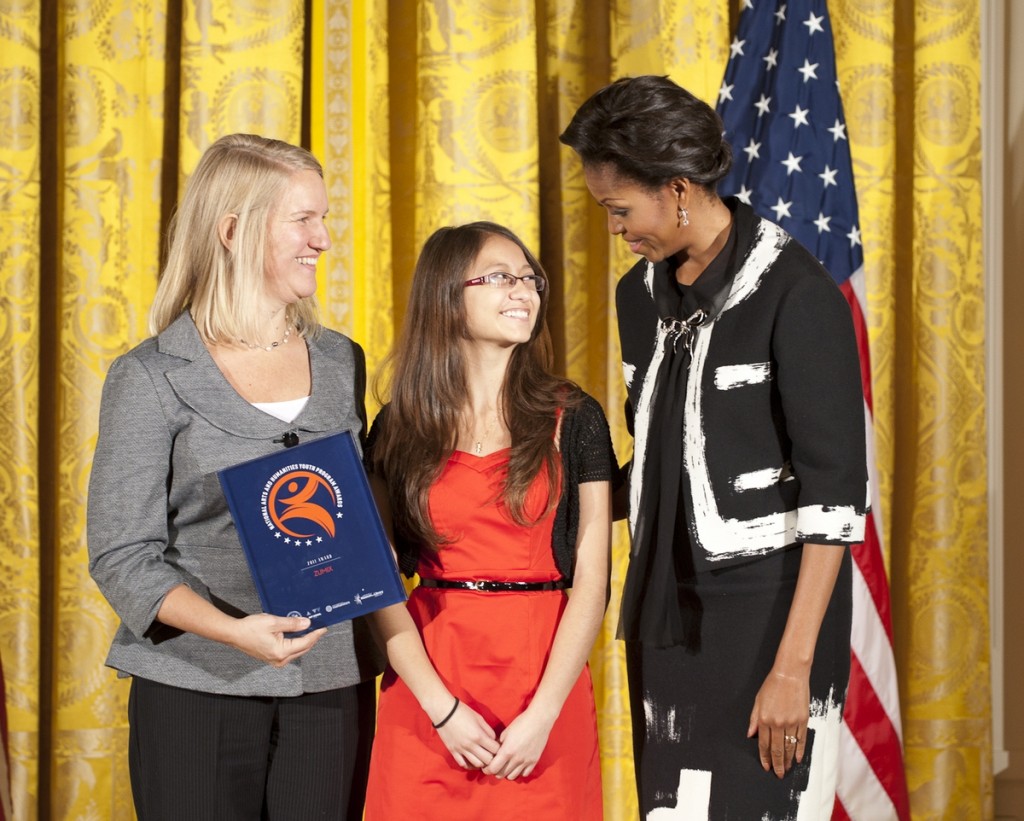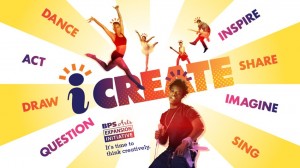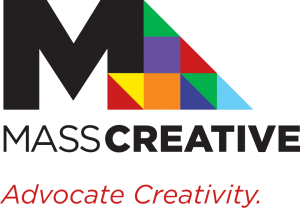Collective Advocacy in Our Community

ZUMIX’s Madeleine Steczynski and Ixchel Garcia proudly accept the National Youth Arts and Humanities Program Award from First Lady Michelle Obama.
Compared to other states, Massachusetts had a poor track record of public support for the arts. Examples from other cities that inspired ARTWorks‘ early conversations included Seattle’s “percent for the arts” program and Denver’s Scientific and Cultural Facilities District. A feasibility study in Massachusetts led the coalition to decide against pursuing a local, dedicated arts tax, but the dream of securing truly significant support for youth arts suffused the early coalition building and collaborative fundraising efforts.
Moving into advocacy
The coalition began focusing on advocacy in 2007. Experts—including high-level staff from USAID and the U.S. Department of State—shared their perspectives on the importance of advocacy by concerned citizens and helped lead an interactive workshop to enhance members’ skills. ARTWorks program staff laid out the Advocacy Logic Model and facilitated a discussion on how to implement it in a way that would lead to increased public and private support.
ARTWorks provided funding for coalition leaders to attend a program on Excellence in Arts Leadership at Harvard’s Hauser Center. They brought what they learned to the next coalition retreat and led the group in telling their stories—a simple, powerful advocacy tool. This retreat also helped coalition members learn how to build productive partnerships with their local legislators and policymakers.
ARTWorks program staff created Making the Policy Case for Public Investment in Youth Arts about the benefits of youth arts programs that could be easily digested by busy policymakers. Action items geared specifically toward policymakers ensured that legislators and their staff members would have a ready list of next steps to take.
Collective advocacy and grantmaking
In 2009, the coalition turned its attention to increasing public support for youth arts programs by engaging with elected officials and other policymakers. The coalition formed an Advocacy Working Group, which decided that winning a seat at the policy table was just as important as increasing public funding. To that end, they proposed offering grants to coalition member organizations in support of their individual activities and advocacy efforts, including:
- Policymaker site visits to youth arts organizations (elected officials and appointed leaders)
- Retreats for board members to help them deeper understand advocacy and develop their own capacity as youth arts advocates.
- Mobilizing constituents—e.g., parents of young artists, friends of board members, donors, and local community leaders—to vote on legislative or policy actions that impact youth arts and to attend and speak up about youth arts at school or municipal meetings.
- Advocacy events and training opportunities for staff.
The majority of coalition members participated in funded advocacy activities: 14 groups hosted site visits for local and state officials; six organizations focused on mobilizing constituents; and one organized a retreat for their board members. In addition, five coalition members were able to prioritize advocacy as part of their regular programming.
ARTWorks coalition members met with 27 local and state policymakers from eastern Massachusetts, and with leaders of public and private entities that serve youth, such as the Massachusetts Department of Youth Services, the Boston Public Schools, and the Mayor’s office of neighborhood services.
The grants ranged from $3,000 for smaller events organized by two coalition members, to $28,000 for more involved events, such as ART is Part of the Solution, at the Massachusetts State House organized by five coalition organizations. Only group advocacy activities were considered for grant funding; a minimum of two organizations had to apply together, and priority was given to activities that engaged donors and/or youth.
2011 Grant Report: Express Yourself and Boston Children’s Chorus
2011 Grant Report: From the Top and Conservatory Lab Charter School
Advocacy successes
Boston Public Schools
When Boston hired a new school superintendent, ARTWorks seized the opportunity. Coalition leaders met with Dr. Carol Johnson early in her tenure and found a true ally: she preserved arts teaching positions, even in the face of significant budget challenges. Dr. Johnson worked with five local arts funders, including Swanee Hunt‘s foundation, to partner with EdVestors on the Boston Public Schools Arts Expansion Initiative.
This multi-year, public-private partnership of local funders, the school district, arts organizations, institutions of higher education, and the Mayor’s office came together with the goal of providing sustainable, quality arts education to all students in Boston’s public schools.
This initiative attracted national funding from the Wallace Foundation and to date has produced remarkable gains: since 2009, an additional 14,000 students in Boston Public Schools have experienced art during the school day. The number of pre-K – 8th grade students receiving weekly arts instruction has increased by 28%; the number of high school students receiving any arts instruction has increased by 115%.
Dancing to the Top: How Collective Action Revitalized Arts Education in Boston
MASSCreative
ARTWorks contributed to the formation of MASSCreative, collaborating with other funders (including the Boston Foundation, the Barr Foundation, and the Klarman Family Foundation) to launch this statewide arts advocacy organization in 2012. MASSCreative first mobilized the arts community to win a substantial budget increase for the Massachusetts Cultural Council, reversing years of declining allocations.
In 2013, the city of Boston faced a significant power transition: Thomas M. Menino, mayor for the past 20 years, was retiring from office—and the race was wide open. Twelve candidates faced off in the primary. Recognizing a great opportunity to elevate the issue of arts support, MASSCreative launched a comprehensive campaign to make arts a priority in the mayoral race: Create the Vote Boston. Boston voters elected Marty Walsh as their new mayor in 2013 and many referred to him as an “arts mayor”—a descriptor he embraced.
In 2014, MASSCreative turned its focus to the gubernatorial election: Create the Vote 2014. They organized the campaign’s only statewide arts-focused forum. Six of the seven candidates stood before almost 700 people to describe their visions for the arts respond to questions from arts advocates in the audience. Despite this campaign highlight, the candidate who didn’t participate in forum, Governor Charlie Barker, was elected. MASSCreative has launched #ArtsMatter initiative to ensure arts are a priority at a state-level. In 2015, the Massachusetts House and Senate voted separately to restore $2.37 million to the Massachusetts Cultural Council‘s budget, overriding the Governor’s earlier veto of the increase.
MASSCreative: 6 Basic of Organizing an Effective Campaign
“Every job that’s available will require creativity, will require thinking outside the box, will require persistence and effort. And I think that the arts teach all of those skills.”
Former Boston Public Schools superintendent Dr. Carol Johnson

